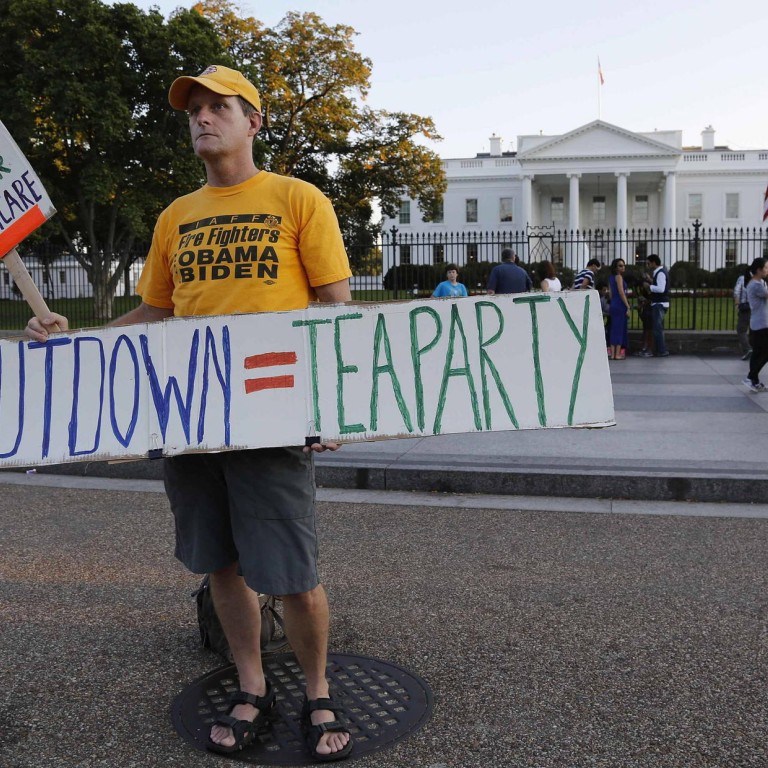
Beijing calls on US to resolve debt ceiling issue 'to ensure safety of Chinese investments'
Debt ceiling issue must be resolved to 'ensure safety of Chinese investments', says official, as stand-off continues with nine days to deadline
A senior Chinese official yesterday voiced concern over a looming deadline for raising the US debt ceiling, saying the "clock is ticking" to avoid a default that could seriously damage China's economic interests.

"It is important for the US economy as well as the global economy."
Zhu spoke with the US government in a partial shutdown since the start of this month due to a dispute between Republicans and Democrats over funding for Barack Obama's signature health care programme that has prevented the passage of key spending legislation.
An even more serious problem is the prospect that the US government will not have enough cash to pay its bills if an agreement to raise its debt ceiling is not reached by October 17.
Treasury Secretary Jacob Lew said on Sunday the US will have reached the maximum it is allowed to borrow on that date, and with only US$30 billion cash in hand to meet obligations that can run to US$60 billion a day, it will quickly face default.
Zhu called on the US to take quick and decisive action.
"We hope that before October 17, the US will take credible steps to address its disputes over the debt ceiling in a timely fashion, avoid a default and ensure the safety of Chinese investments in the US and ensure the process of global economic recovery will not be seriously affected by this."
Zhu said the two sides have been in close contact on the issue and the US was aware of China's concerns about the gridlock.
Republican House of Representatives Speaker John Boehner pledged not to raise the debt ceiling without a "serious conversation" about what is driving the debt. Democrats said it was irresponsible and reckless to raise the possibility of a default.
The last big confrontation over the debt ceiling, in August 2011, ended with an 11th-hour agreement under pressure from shaken markets and warnings of an economic catastrophe if a default were allowed to occur.
A similar last-minute resolution remains a distinct possibility this time as well.
But in comments on Sunday, neither Republicans nor Democrats offered any sign of impending agreement on either the shutdown or the debt ceiling.
Both blamed the other side for the impasse. "I'm willing to sit down and have a conversation with the president," said Boehner. But he added that Obama's "refusal to negotiate is putting our country at risk".
Secretary Lew said Obama would not negotiate until "Congress does its job" by reopening the government and raising the debt ceiling.
"I'm telling you that on the 17th, we run out of the ability to borrow, and Congress is playing with fire," Lew said.
Investors were unnerved by the apparent hardening of the parties' stances over the weekend, with European shares falling to a four-month low yesterday and the dollar and oil prices also slipping.
Conservative Republicans in the House have resisted funding the government for the current fiscal year until they extract some concession from Obama that would delay or defund his healthcare law, which was launched on October 1.
Many of those conservatives want a similar condition placed on raising the debt ceiling.
But in his list of debt-ceiling demands on Sunday, Boehner did not mention the Affordable Care Act, commonly known as Obamacare.
"It's time to talk about the spending problem," said Boehner. He called for discussions about measures to rein in the cost of entitlement programmes such as the Social Security retirement system and Medicare, the government-run health insurance plan for seniors.
In the last two days of the debt limit stand-off of August 2011, the New York Stock Exchange lost 11.2 per cent of its value and the deadlock led to a downgrade of the US credit rating to "AA+" from "AAA" by Standard & Poors.
The outlooks from Moody's and Standard & Poor's, the only agency so far to have lowered its rating on US debt, are both currently at "stable," but Fitch Ratings has indicated a negative outlook for the US debt position.
Political gridlock remains the greatest risk to the US outlook, Fitch said in its note of October 1, the first day of the partial shutdown of federal government operations.
